"Can you dance your tragedies?
Can you dance your dreams?
If you are Palestinian, you almost
have no choice but to try doing both,"Omar Barghouti 2003
We want to recommend two wonderful albums to you. They are not new, but this blog is, lol, and we've not had a chance to share our music tastes with you before!
They are 'Zaghareed: music from the Palestinian Holy Land' and "Zareef: folkloric tunes from Palestine" by El-Funoun, or more properly El-Funoun Palestinian Popular Dance Troupe, based on the West Bank.
Here at the Archive we have enormous regard for El-Funoun ("the arts" in Arabic). They too travel the world, promoting the beauty of Palestinian cultural heritage. They face similar problems to the Archive. Worse, because they are still in Occupied Palestine and we are in exile. But our mandates are very similar. Janice Steinberg noted in her 2006 article about El-Funoun, in regard to the founding of the company:
“(Former Israeli Prime Minister) Golda Meir boasted that there was no such thing as the Palestinian people,” said Omar Barghouti (the company's trainer and choreographer). “We did not exist in the eyes of the colonizers.” Meir's 1969 statement, published in The Sunday Times of London and The Washington Post, was, “There were no such thing as Palestinians. When was there an independent Palestinian people with a Palestinian state?”Sounds just like the Archive, doesn't it?! Where for the last twenty years Archive staff have researched lost Palestinian costume and related heritage traditions not only in the Palestinian region but in refugee camps and the scattered communities of the diaspora, El-Funoun (quoted from production notes):
"Although Meir later said she'd been misquoted, the comment was seen as reflecting an attitude held by much of the world. And the handful of artists who founded El-Funoun set out to prove that they indeed had a national identity, giving even their most lighthearted dances a political purpose".
"began with a mission to revive Palestinian music and dance folklore as a manifestation of national identity. Its early works were the result of extensive research in Palestinian villages, preserving centuries-old songs and dances, including the "dabke", a traditional dance form popular among Arabs of the Eastern Mediterranean, using traditional Arab instruments (oud, nai, and tabla)".
One of the things we really admire, that El-Funoun achieved - to counter Israeli attempts to suppress Palestinian national identity - was the establishment of Palestinian Folklore Day, in 1986. But at times it wasn't easy, as Gia Kourlas reported in her dance review "Palestinian dreaming: resistance and joy" in the New York Times Magazine in 2005:
"In its beginnings, occupation authorities viewed El-Funoun negatively. "We were persecuted in many ways," Mr. Barghouti recalled. "There were travel bans, and some of our members were arrested and accused of belonging to a subversive dance company."With the loss of funding post 9/11 and the loss of one of our exhibitions in 2003, here at the Archive we have sometimes felt like giving up. But we 100% agree with Khaled Katamish (Director of El-Funoun) that "Palestinian cultural organizations ... must persevere against hugely unfavourable odds" and support and acknowledge El-Funoun's approach to artistic creativity and activism in via:
"In the 1980's and early 90's, he said, that view began to shift as the company's reputation grew. "The challenge became, What type of identity do we want?" he said. "We see our dance as a form of civil, cultural resistance to oppression, and that starts with the occupation, but not just that - we are also against social oppression, so in our dances you'll see a lot of issues dealing with women's liberation, equality and democracy."
- "unwavering commitment to the struggle against the illegal Israeli occupation"
- presenting a "distinctive blend of authenticity with modernity, fostering cultural bridges between cherished tradition and contemporary ambition"
- a "progressive social agenda, especially regarding democracy, women's emancipation and youth rights" and
- "earnest opposition to agit-prop art as well as to artistic works that tend to portray the Palestinians as nothing more than pitiful victims waiting for a savior"
There are about seventy members of the company, which includes dancers, musicians and administrators, all volunteers (like us!). There's also a youth group ("to counter the marginalization and alienation of Palestinian children and youth through music and dance expression") and members of the company teach in a variety of settings, including refugee camps. What we love is that they teach both tradition and innovation, which for any culture contains the seeds of a future. Omar Barghouti calls it "contemporary Palestinian dance ... inspired by our folk tradition, but not imprisoned in its limited realm".
We shall keep a detailed discussion of their performances for another post, because after all in this post we are supposed to be talking about their music (if you really can't wait, here's a secret - click here or here). But we'd like to share this review, because we know Palestinians out there will understand these words, by Ahmad Qatamish:"It is an art that raids your soul in its depths, a patently Palestinian spirit, evoking the conscious as well as the spontaneous memories. It is smooth and intense; it impresses, without draining; it attracts, never repels; and, above all, El-Funoun’s art boosts the morale and expels despair, thereby emancipating the soul from the siege of time, and leaving an imprint of hope on it instead.We hope someday someone will write about the Archive staff like that! Okay, so back to those CDs:
"How charming this persistence! How can a group made up of volunteers accomplish such a professional art? Perhaps the answer lies in the unique mix of charm and heroism: charm of contemporary innovation and heroism of rooted authenticity"
 'Zaghareed: music from the Palestinian Holy Land' was recorded at the Popular Art Centre in Ramallah. The musicians include Najah Atiyeh, Safa Tamish, Nidaa Hajali, Ali Awad, Mohammed Yacoub (vocals), Muhsen Subhi (buzuq, oud, percussion), Thafer Al-Tawil (qanun), Abu Steif (mijwiz), Abu Ashraf (shabbabah), Raid Al Kobary (nay) and Mohammad Amin (bass, percussion).
'Zaghareed: music from the Palestinian Holy Land' was recorded at the Popular Art Centre in Ramallah. The musicians include Najah Atiyeh, Safa Tamish, Nidaa Hajali, Ali Awad, Mohammed Yacoub (vocals), Muhsen Subhi (buzuq, oud, percussion), Thafer Al-Tawil (qanun), Abu Steif (mijwiz), Abu Ashraf (shabbabah), Raid Al Kobary (nay) and Mohammad Amin (bass, percussion).The word zaghareed describes the ululations of joy heard in many parts of the Arab world. Here, these cries are intermingled with instruments (including oud, daf and ney) and voices (male and female soloists and choruses) that draw us irresistibly into the mystery of Palestine, and evoke a centuries-old spiritual landscape of longing, hope, and celebration. The titles of the tracks recall the traditions of the wedding: Tulbah (Proposition), Chiming Bracelets, Farewell To Bachelor Days, Groom's Bath, Henna, Zaffah (Wedding Scene), Adornment Of The Bride all leading to Initiation Of Ecstasy...
'Zaghareed' was a huge success, and is available around the world in major music stores as well as online. This really was a first for a Palestinian CD. Everyone was really hanging out for what El-Funoun might follow it up with ... and when it appeared, it didn't disappoint: "Zareef: folkloric tunes from Palestine", whose production was supported by the Swedish International Development Agency (SIDA), the Swiss Cooperation Office and the Palestinian Cultural Fund.

A "collection of some of the most poignant, revived, Arab/Palestinian folk tunes that have gained popularity in the 27 years since the dance troop began its interpretations of the tunes", the CD features evocative vocals by Sana Mousa, Safa Tamish, Najah Makhlouf, Muhammad Musa, Mansour Barghouti and Muhummad Yaqoub.
The re-arrangement of the folk tunes is by well known musician Tareq an-Nasser (except for one track composed by Suhail Khoury, who in 1989 also did the original music arrangements for several other tracks). He has done a superb job, and the result is a warm and vibrant CD which brilliantly brings alive some of our favorite Palestinian songs. This of course is part of the reason for the project - to revive Palestinian music, which El Funoun then put to great effect as the musical foundation of their youth group's new dance production Raqsit Shamis (Dance of the Sun).
We absolutely agree with the reviewer in This Week in Palestine:
"El-Funoun has always believed that its mission to communicate with other cultures and to affect social and cultural change at home through dance and music relies on a delicate balance between modernity and heritage, contemporariness and roots.Let's hope it gets picked up by Amazon.com, who have been selling 'Zaghareed'. Reviews of the latter were extremely high. Amazon reviewer a music fan fan observes: "this album helps to preserve the culture and history of Palestine and the Palestinians, Christian and Muslim alike. .... May the world become more aware and educated regarding this kind of music and the music and folk dance of the region, and more importantly, the symbolism,emotion, and history that created it", while Yaser Abdelhamid noted:
"In Zareef, El-Funoun succeeds in maintaining such a balance, presenting an often ignored aspect of Palestinian identity and adding another important achievement, a new benchmark, to its already luminous record of accomplishments in the realm of developing art as a form of civil resistance against political and social oppression ... Zareef serves a full course of authentic enjoyment to the senses, reasserting Palestine’s culture and inexorable humanity"
"I have owned Zaghareed' ... for well over one year, and have allow[ed] its enchanted calls to enter my heart daily. As a Palestinian - American, I have found very little literature, video, and audio on the specific category of things Palestinian. It was like a breath of fresh air blew into my soul as I stumbled upon this excellent production and recording of traditional Palestinian folk music.Sounds like Yaser might approve of what we do as well! There are not many of us, "preserving and capturing" Palestinian heritage, but we are increasing ... and one day inshallah El-Funoun may perform or play at an Archive exhibition opening...
"This is the music of the people of Palestine. I have always hoped that someone somewhere would devote much time and energy towards preserving and capturing - on the record - the unique dress, dance, and music of the still traditional people who call themselves Palestinians. This wonderful CD has done just that, and has further satisfied the thirst of this spirit in reclaiming a bit of its Palestinian heritage. Good listening to all who care about preserving the sounds of tradition wherever they may still exist".
You can buy 'Zaghareed: music from the Palestinian Holy Land' from Amazon.com, and "Zareef: folkloric tunes from Palestine" from El-Funoun and the Palestine Online Store.
"Cultural expression to us, then, serves dual purposes: self-therapy and expansion of the "free zone" in our collective mind,where progressive transformation can thrive. In response to all the attempts to circumscribe our aspirations, we must push on, dreaming and being creative,boundlessly. Thus we dance..."Omar Barghouti 2003









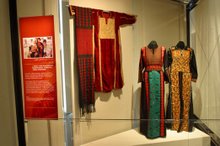






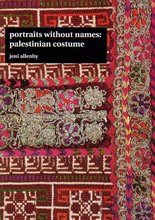
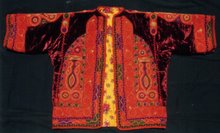
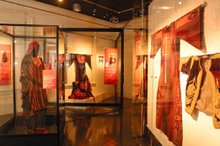
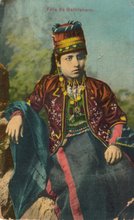

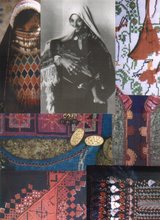













2 comments:
I saw them on their last American tour. They were great.
Keep up the good work!
Oh you were SO lucky! Did you take any good photos?!
And shukrun, we'll try re keeping up the good work....!
Post a Comment